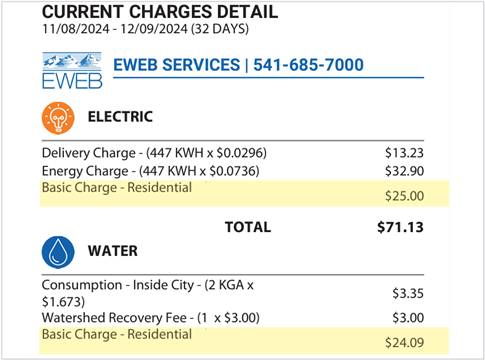If you look at your EWEB bill, you will notice different types of charges that make up the total amount owed. These types of charges vary by customer class (residential, commercial, and industrial), but fixed charges (Cost of Basic Service) and volumetric charges (kWh and KGAL*) are always present.

What is the Basic Charge on my EWEB bill?
The basic charge helps EWEB recover some—but not all—of the fixed costs of providing your service, which don't change regardless of how much energy or water you use. These costs include:
- Infrastructure and equipment like meters, poles, transformers, pipes, and trucks needed to service our territory of about 240 square miles
- Buildings to house necessary fleet and equipment
- Labor to provide customers with safe and reliable service, including system maintenance, emergency response, engineering, and planning
- Business functions including billing, information technology, phone systems, costs related to accounting, financing, collections, dispatching, customer service, and communication
- Debt service on bonds issued to fund major capital projects
- Insurance and other overhead costs
These costs are fixed because EWEB incurs the same cost to build the line, install the pipe, and maintain the systems that deliver water and electricity to your home, regardless of how much energy or water you use in any given month. The basic charge is intended to ensure each customer is paying a fair share of the cost to access electric and water services.
Does the basic charge cover all EWEB’s fixed costs?
The quick answer is no. EWEB periodically completes what is known as a Cost of Service Analysis which determines how costs should be allocated and recovered through rates. The analysis shows a gap between EWEB fixed costs and revenue collected from the basic charge.
While increasing the basic charge helps stabilize funding, we recognize the importance of conservation, equity, and affordability for all customers. To limit the impact on customer bills, we are implementing gradual increases to the basic charge over time. By phasing in these adjustments, we aim to carefully balance covering essential fixed costs while still encouraging efficient resource use and minimizing the burden on low-usage and low-income customers.
Looking ahead, we will need to continue to design rate structures that reflect the true costs of providing electric and water services.
Learn more about how your rates are set and what you get for your money.
* kWh (kilowatt hour) is a measure of how much energy you’re using. One kilowatt hour is the amount of energy you’d use if you kept a 1,000 watt appliance running for an hour. KGAL is short for kilogallon, or 1,000 gallons. An average household in Eugene uses about 1,600 kWh of energy and about 9 KGALs (9,000 gallons) of water per month.

